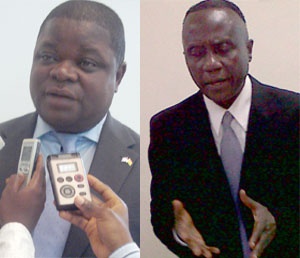Dr Peter Quartey, Executive Director of the Institute of Statistical, Social and Economic Research (ISSER), says Ghana’s growth rate targeted in Government’s 2013 Budget Statement, is not enough to move Ghanaians out of poverty.
Making a presentation recently at Citi Fm’s 2013 Budget Review Roundtable in Accra, he said the growth rate for 2012, which stood at 7.1 percent and the recorded per capita income, were just not enough to grow the economy, adding that the issue of how many jobs were created was conspicuously missing.
Citing examples of some figures recorded for the various sectors of the economy, he said the agriculture sector, which employs over 50 percent of the population, only grew at 2.6 percent.
“This is not encouraging. I would want to see more initiatives even in industry and services. Manufacturing is also key since it employs a greater proportion of Ghanaians. But painfully, most industries are closing down.”
On inflation, which recorded single digit for 2012, he commented: “I tend to worry because there is a trade-off between inflation and employment. Low inflation means hitting hard on employment so there needs to be a good balance between inflation and employment. There should be a good mix. It is missing in Ghana. Such a mix should be able to give us jobs.”
On government’s recent increases in taxes, he quizzed: “What kind of business will a person do for them to generate 35 percent profits?” Dr Quartey averred that though the 2013 budget targets were feasible, they were not far from those recorded in 2012.
Commenting on interest rates charged by microfinance companies operating in the country, he stressed that the quasi-financial institutions do not charge micro interest rates.
“They charge macro interest rates: between 8 and 10 percent per month. What kind of business can you do and charge an interest of 8 and 10 percent? You are talking about 100 percent interest rates per annum. It is irrational to borrow from a micro-finance institution.
And I have come across quite a number of Ghanaians who are suffering because they have borrowed from micro-finance institutions. A good number of them have been sent to court over this and I think we need to regulate this sector and ensure that they charge realistic interest rates on microfinance activities.
In a presentation, Dr John Kwakye, an economist, who was happy to see Ghana’s revenues grow, opposed government’s increment of income tax, corporate tax and VAT rates since they were already high.
“I welcome increases in other tax rates in the budget. But I expected to see more broadening of the tax base such as roping in more informal sector operators. Property tax has a huge potential, given the sprawling mansions in the cities, and should be fully exploited. Tax exemptions and incentives are huge and should be curtailed without much delay.”
Dr Kwakye noted: “I see the wage bill go up further from 9.2 to 10.1 percent of GDP. The wage bill seems to be escalating out of control and I think there is a need for a national debate about how to contain it.”
“What happened to public sector reforms intended to achieve a leaner, productive, and well-remunerated public sector? And do we have to revisit the SSSS to ascertain its long-term viability? There is also government consumption of goods and services, where there is room for savings. I expected subsidies to be further curtailed and the savings plucked into social and development expenditure.
Having said that, I do not see a clear line for capital expenditure in the budget, but my expectation always is to make this the priority given its importance for growth. And my fear is that, in the end, it will be sacrificed for the expediency of recurrent expenditure,” he said.
The economist added that the excessive earmarking of revenue in terms of wages and statutory funds (GETFUND, DACF, NHIF, Road Fund), left little for discretionary expenditure, especially development expenditure.
Business News of Friday, 15 March 2013
Source: Daily Guide

















